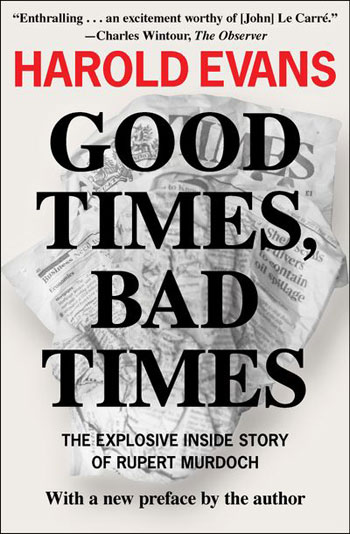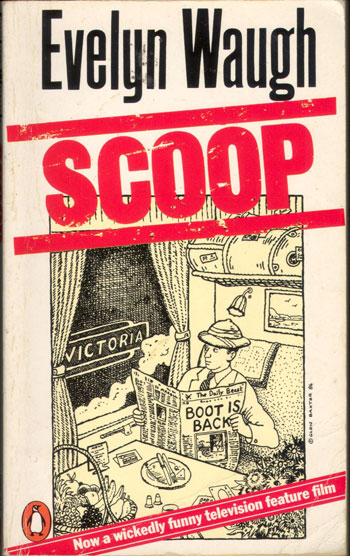
Last week, we looked at the Film & TV Show category. This week, we are looking at the top media Books (Fiction & Factual). Next week, we shall reveal your views on who the most influential people in media will be this year.
The Film & TV category votes were clearly influenced by the age of the respondents - for many older media insiders, the 1970s were seen as a golden age, particularly of investigative journalism. Yet, when it comes to books, the picture becomes much more complex and varied. And some of you actually don’t like reading books very much … As one respondent put it, “You’re either into books or you’re not. And I’m not!”
The Top Five Factual Books
- Good Times, Bad Times (Harold Evans)
- My Paper Chase (Harold Evans)
- News & How to Use It (Alan Rusbridger)
- Flat Earth News (Nick Davies)
- Paper Tigers (Nicholas Coleridge)

Good Times, Bad Times (1983) … “No one else quite captures what newspapers are all about.” … “I lived through it.” … “Because it addresses, through the story of the rise of Rupert Murdoch, the tension between profit & power and principled journalism.”
Harold Evans also appears in the No.2 slot, with My Paper Chase (2009) … “The governor gives precious insights.” … “Harks back to a different era of journalism.”
News & How to Use it (2020) at No.3 is Alan Rusbridger’s leading contribution … “comprehensive overview of the media - interesting and easy to read.”
Flat Earth News (2008) is at No.4 … "Really opened my eyes to the reality of the news industry, and it's really well researched.” … “I found his insights and expose of how the newspaper industry works really quite shocking.”
At No.5 is Paper Tigers (1993) … “A bit dated now, but a magnificent tour de force. Who else but Nick could travel the world and be on first name terms with all the newspaper titans he met.”
The Best of the Rest
An eclectic mix of media history and “how it works” explanations, biographies and journalism textbooks. And Harold Evans runs through this list too!
In alphabetical order:
- A Mad World, My Masters (2000, John Simpson) … “John Simpson's autobiography about his life in media is so interesting.”
- Airhead (2019, Emily Maitlis) … “So many brilliant behind-the-scenes vignettes. Some familiar, others wholly surprising. Her description of her now-famous impromptu interview with Anthony Scaramucci is pure gold.”
- All The President's Men (1974, Bernstein & Woodward) … “The book is able to go into greater detail than the film; and of course, it was written by the two principal players, adding a strong sense of reality.”
- Breaking News (2018, Alan Rusbridger) … “The inside story on why the industry is how it is today, from one of its chief architects.”
- Celebrity Diaries (2008, Mark Frith) … “The story of Mark editing Heat. I was there too!”
- Divorce Corporate Style (1972, Don Gussow) … “The true story of a small New York B2B publisher, who sold to a larger one only to buy it back a few years later.”
- Eats, Shoots and Leaves (2003, Lynne Truss) … “Stone cold classic punctuation bible. It shows standards should matter more than ever in today's digital media landscape, where pretty much every article you read on your phone is strewn with typos.”
- Editing & Design (1977, Harold Evans) … “Seminal. By the Old Master.”
- Everything bad is good for you (2005, Steven Johnson) … “It basically demonstrates that popular culture has grown more complex over the years and influences most of what we do as individuals, whether we like it or not.”
- Hack Attack (2014, Nick Davies) … “Shows Murdoch up for what he is.”
- Here at the New Yorker (1975, Brendan Gill) … “A real insider view of an iconic magazine.”
- Inside Magazine Publishing (2014, David Stam and Andy Scott) … “The best overview I’ve come across about how magazines work.”
- Marathon (1977, Jules Witcover) … “Very dated, but it was the book I read in high school that committed me to the path that I am on now. Probably shouldn't have read it, all things considered but here we are!”
- Fall (2020, John Preston) … “The best account yet of the vile, but fascinating Robert Maxwell.”
- Media Control (1991, Noam Chomsky) … “Read it at university and it’s always stuck with me.”
- Murdoch (1993, William Shawcross) … “The best way to understand Rupert Murdoch, what he does and how he operates, even though it is old.”
- Ogilvy on Advertising (1983, David Ogilvy) … “The most helpful, practical and clear, book I have ever read on media.”
- Pictures on a Page (1978, Harold Evans) … “The classic on photojournalism. Never bettered.”
- Point of Departure (1967, James Cameron) … “The eye-witness account of a journalist coming to terms with the world he’s reporting on.”
- River of Time (1995, Jon Swain) … “A riveting and unforgettable insight into war reporting.”
- Stick it up your Punter (2013, Chris Horrie & Peter Chippendale) … “It makes you proud and ashamed, at the same time, to be in the business.”
- Succeeding Against the Odds (1989, John H Johnson) … “A graphic portrayal of the racism encountered by the pioneering publisher of Ebony magazine. A fantastic story, which is heart-breaking and inspirational at the same time.”
- The Long Tail (2006, Chris Anderson) … “A very insightful explanation of how to sell less of more and profit from the long tail. Something we all need to be able to do now!”
- The Age of Surveillance Capitalism (2018, Shoshana Zuboff) … “A serious academic study of how we got into this catastrophic mess with social media.”
- The Vanity Fair Diaries (2017, Tina Brown) … “For a woman like me who wants to get on in magazine publishing, this is an inspirational guide.”
- Understanding Media (1964, Marshall McLuhan) … “This book has more ideas in it than any ten other books on communications. It still describes the future and the present - not conceptually outdated at all.”
- Waterhouse on Newspaper Style (1989, Keith Waterhouse) … “One of the best ever guides to good news writing.”
- Zucked (2019, Roger McNamee) … “A fascinating and frightening deep dive by a former Silicon Valley insider into the huge and insidious power of social media, primarily Facebook. It argues that the big social platforms are a danger to society and makes a compelling case for regulation.”
The Top Five Fictional Books
- Scoop (Evelyn Waugh)
- Towards the End of the Morning (Michael Fray)
- New Grub Street (George Gissing)
- Sunday Morning (Ray Connolly)
- The Way We Live Now (Anthony Trollope)

Evelyn Waugh’s Scoop (1938) won the No.1 slot by a surprisingly large margin despite its age … “It isn't politically correct and it doesn't represent modern journalism, but it is a great read and very thought provoking.” … “Just the best – captures the atmosphere of the newsroom.” … “A comic novel on the absurdity of journalism and manipulation of public opinion - even though Waugh was a nasty piece of work himself!”
Towards the End of the Morning (1967) came in at No.2 … “Brilliant” … “Funny” … “Enjoyably low-key. Always identified with it.”
New Grub Street (1891) seems a wild choice in some ways because of its sheer age. Yet it still resonates with a lot of people, who pushed it into the No.3 slot. … “Set in the world of hack journalism in late Victorian London, this novel looks at the value (moral and financial) of writing. One of the protagonists is a novelist whose output is never going to make him wealthy, while the other is a journalist who is not a complete baddie, but is much more cynical about the way things can, and maybe should, work.”
At No.4 is Ray Connolly’s Sunday Morning (1992). … “A wonderful evocation of magazines and newspapers from the Swinging Sixties through to the Seventies, when everything was possible” … “I think that it’s calling out for a sequel!”
The fact that another Victorian novel, The Way We Live Now (1875) comes into the top 5 perhaps says a lot about modern media fiction … “It’s ancient, but it is so good, And so modern in some ways.” … “Like Dickens’ novels, it was serialised in monthly parts. Like a partwork. Or the Victorian equivalent of a streamed TV series, in slow motion. Everything comes around again in a slightly different way!”
The Best of the Rest
This list is much shorter than the fiction list, perhaps bearing out one Media Insider’s assessment that “most modern media fiction is pretty patchy!” Yet a number of these have also been made into films – all very multi-platform!
In alphabetical order:
- A Brief History of Seven Killings (2014, Marlon James) … “I’m reading it at the moment and it's very interesting how it depicts celebrity and pop culture and how that interacts with politics, poverty, etc.”
- Empire (1987, Gore Vidal) … “Historical fiction at its best – trashy and non-trashy at the same time.”
- Fear and Loathing in Las Vegas (1971, Hunter S Thompson) … “Very entertaining gonzo journalism - not sure it's all fiction though.”
- Fourth Estate (1996, Jeffrey Archer) … “A Maxwell versus Murdoch type battle, about two characters fighting to build the largest media business in the world. A good, but easy read. Shame it’s by Jeffrey Archer though.”
- In Cold Blood (1965, Truman Capote) … “Capote described it as the non-fiction novel. Often copied.”
- Holidays in Hell (1988, P J O’Rourke) … “A very funny examination of the role of the freelance foreign correspondent.”
- Sweet Caress (2015, William Boyd) … “The fictional autobiography of a war photographer which covers so much territory.”
- The Circle (2013, Dave Eggers) … “A spookily accurate fiction built around social media and Big Tech.”
- The Girl with the Dragon Tattoo (2005, Stieg Larson) … “Intriguing characters with a media backdrop.”
- The Quiet American (1955, Graham Greene) … “One of the few books that is equalled by the film. It is always said that Greene was writing screenplays when he wrote his novels.”
Look out for the mediaONmedia Media Influencers next week.

The mediaONmedia poll is run by Wessenden Marketing and InPublishing. If you have any feedback, please email Jim Bilton.










